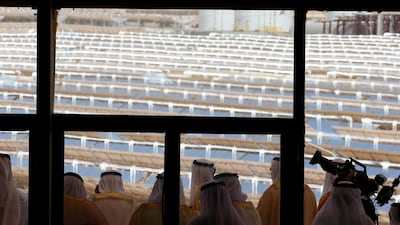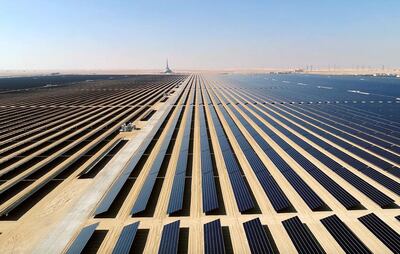Europe's plans to use more clean energy under the Green New Deal will ultimately benefit the Gulf's oil-producing countries, a panel of experts suggested.
Speaking at an online meeting to discuss the effect of EU's environmental ambitions, Frank Wouters, director of the EU GCC Clean Energy Network, said Europe did not have the resources to produce hydrogen cleanly and would have to import it.
He said it could be from North Africa but more likely the Gulf region, "because not only do they have low-cost hydrocarbons but the lowest-cost solar in the world, and that’s a blessing”, he said.
A report released last week by the Mena Hydrogen Alliance, which Mr Wouters co-founded, said production of hydrogen could create one million jobs and generate $200 billion for the region by 2050.
Richard Burchill, a senior research fellow at the Bussola Institute in Brussels, said the GCC did not have the same institutional framework as the EU to create its own green deal but that a more cogent and integrated environmental approach among Gulf nations was still possible.
“What we need to work towards is trying to get the GCC as a group, and not just the individual members, to declare something similar in terms of commitment," Mr Burchill said.
"So, beyond their national visions, where they've all declared a commitment to addressing climate change, they need to stick that into the regional forum so that then becomes part of their ongoing external activities.”
The geopolitical situation could create more opportunities for EU-GCC co-operation on climate concerns, he said.
The UK will be hosting COP 26 in Glasgow in November, when world leaders will meet to discuss global climate challenges.
Mr Wouters said Gulf states’ understanding and acceptance of the Green New Deal had changed "dramatically" since he was in Riyadh last year for the fourth International Energy Forum-EU Energy Day conference.
“Back then, it felt a bit like going to the butcher shop and telling them you want to become a vegetarian,” he said.
Saudi Arabia has since launched its circular carbon economy scheme, he said, aimed at lowering the amount of carbon released into the atmosphere.
Environmental concerns were prevailing in the Gulf, but Mr Wouters said more engagement and dialogue were needed, “because the Green Deal is not just about energy, it's an economic package".
"It wants to fundamentally transform the EU. And that needs explaining because it's not immediately very evident to everybody,” he said.
The diversification of oil-producing economies has become an increasing concern in the past decade, but energy policy expert Irina Kustova said alternative types of energy, like hydrocarbon, were important for the Gulf region to consider.
"The Gulf countries are a perfect place for green hydrogen production given the low-cost electricity, like solar, but there is a long road ahead," the Centre for European Policy Studies researcher said.
She said countries in the Gulf still needed to restructure their power generation sector to ensure there was enough capacity to produce green energy for export, as well as for domestic consumption.



